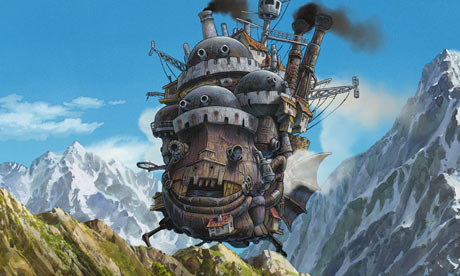
Some of these books are classics that I've talked about before and that you'll find on plenty of school and library reading lists. But a few of the books that I adored as a kid don't often make it into interviews. They're the weird, lovely, creepy tales I read and reread, that shaped my early taste in stories and that still guide my choices as a reader and author today.
1. Catwitch by Una Woodruff and Lisa Tuttle
As you may have guessed, this book is about a cat. Who is also a witch. Jules is a kitten who longs for adventure, so he leaves his brethren behind and ends up familiar to a witch (a fading starlet looking to regain her glamor). There's a nefarious real estate developer, a fairy court, and yes, even a unicorn brought to life in absurdly lush illustrations.
I adored this book and must have reread it hundreds of times as a kid. It's one of those books where the illustrations reveal something new with every close perusal. Plus the story has a real sense of darkness and magic, and a plot twist that left my impressionable mind reeling.
2. The Witch of Blackbird Pond by Elizabeth George Speare
While I'm on the topic of witches, this classic was foisted on my by a teacher at a school book fair. It gave me an independent, courageous, occasionally rash heroine to root for, and began my love of historical fiction (not to mention free-thinking sea captains).
3. Bunnicula by James Howe
My first vampire book. Is this the novel that paved the way for my future infatuation with Lestat? Bunnicula arrives straight from the Carpathians (Transylvania) and when vegetables begin appearing drained of their juice, it's up to a grumpy cat and a cupcake-loving dog to ferret out what secrets this cuddly predator may be hiding.
This book sounds really cute, right? But I remember finding it pretty scary in places and being truly engaged in the mystery. Also, I wrote to James Howe when I was a little girl and he wrote back. He answered all of my questions with great seriousness and generosity. From then on, whenever I saw one of his books, I felt like I had a connection not just to him, but to all writers.
4. Dune by Frank Herbert
Paul Atreides is not your typical YA hero. He's the son of a Duke and has every advantage: wealth, loving parents, brilliant instructors. But when he lost his father and had to make his way on a new and unforgiving planet, Paul taught me one of the most valuable lessons I needed as a teen: being strong or smart or well prepared isn't enough, you must adapt.
5. The Dragonlance Series by Margaret Weis and Tracy Hickman
No Tolkien cred for me. This was my first foray into secondary world fantasy. One of my best friends and I used to call each other Laurana and Sturm. (Actually, we still do. Makes for fun texts: "Congrats on baby #2, Brightblade!") Though my interest lagged after the first six books, the Legends trilogy was my favorite, mostly because of a certain Raistlin Majere, an arrogant mage with a thirst for power and what might best be described as reluctant humanity.
6. Howl's Moving Castle by Dianna Wynne Jones
If you know someone who loves Harry Potter, put this book in his or her hands. It's charming and dire, elaborately imagined, and its whimsy never skews twee. I read this as a kid, but as an adult, I found new meanings in its explorations of age, beauty, and power.
7. Rita Hayworth and the Shawshank Redemption by Stephen King
Maybe it seems a little strange to turn to a story of false incarceration, torture, and human misery as a comfort read, but when I think back on junior high school, I'm not really surprised. After all, this novella is essentially a story of liberation and of never losing yourself, no matter what you endure or how often people tell you you're nothing. (It's also a very satisfying tale of revenge.) I was actually distressed when they made a film out of it, and though it's a good one, I will always have my own set of images associated with the story, particularly the stone walls and fields that Red searched.
8. The Dark Knight Returns by Frank Miller
As a kid, I loved superhero comics. But I don't think it's a coincidence that I started to drift away from them around age 11 - the same time I started being aware of the male gaze. Looking back, I think the problem may have been the dawning understanding that the superheroines I loved were also sexual objects. I saw myself in them and the reflection that came back was distorted. A lot of people hate Carrie Kelley, the thirteen-year-old girl who becomes Batman's new Robin, but she was who I needed to see: an ordinary girl with an ordinary body and iffy taste in eyewear. Say what you will about Miller (no really, say it loudly), but I think this book was for me what Watchmen seems to be for everybody else - a fallible, human, resonant reinvention of the superhero.
9. Many Moons by James Thurber
Wry in its art and its language, this picture book taught me the word "surfeit" and to beware of bureaucrats.
10. A Swiftly Tilting Planet by Madeleine L'Engle
My favourite of this trilogy. The sense of peril is so real. I got my first real sense of the epic, of the way violence and cruelty play out over history, and the comforting, terrifying idea that so much might depend on one brave boy on a single stormy night.

